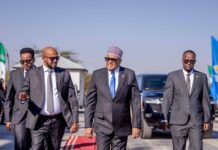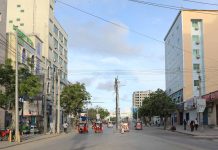MOGADISHU (somaliguardian) – The United Arab Emirates is facing growing accusations of carrying out a drone strike that killed a respected clan leader in northeastern Somalia’s Sanaag region on September 13, in what local residents and activists say was retaliation for his opposition to a resource deal granting Abu Dhabi access to the region’s gold and mineral deposits.
Protests erupted across parts of the Sanaag region, including the town of Badhan, following the death of Omar Abdullahi Abdi, a prominent and influential elder. Demonstrators allege that Abdi was targeted for refusing to endorse a controversial deal between the UAE and Puntland’s leadership, which would allow Emiratis control over the gold-rich Al Madow mountain range.
Protesters demanded immediate clarification from Puntland President Saeed Abdullahi Deni, who has yet to address the incident publicly or offer condolences – an omission that has further fueled public suspicion of his complicity in the strike.
According to regional police and local herders who were near the site of the incident, Abdi’s vehicle was hit by three missiles. The blasts completely destroyed the car, leaving only bone fragments behind. Authorities say preliminary investigations show he was alone at the time of the attack, contradicting claims by pro-government voices that he was accompanied by an ISIS operative.
“The UAE operates from Bosaso in Puntland. Independent reporting and imagery describe Emirati facilities, including radar deployments that support drone operations,” former Somali Foreign Minister and National Security Advisor Abdi Saeed Muse said in a statement posted on X.
Muse cited technical details suggesting the strike was carried out using a UAE-operated Wing Loong II drone, equipped with Blue Arrow-7 precision missiles, each weighing approximately 46 to 47 kilograms.
“The platform that fits this footprint is the Wing Loong II. It carries Blue Arrow-7 class precision missiles… and is a known UAE export system used in other theaters,” he added.
Muse, who is also from Puntland, noted that the airstrike followed meetings between President Deni and elders from the Sanaag, Haylaan, and Bari regions, during which disagreements over resource governance reportedly surfaced. “Abu Dhabi was unhappy with the elders’ stance on resource governance in Sanaag, where Emirati interests have been flagged,” he said.
“This is not the first time UAE operations have faced civilian harm allegations in regional conflicts,” he continued. “Documented cases exist in Puntland, Yemen, and other theaters, which heightens concern when strikes go unclaimed.”
“Taken together, the airframe fragment, the Bosaso drone presence, the platform and munitions profile, and the absence of a U.S. claim point to a UAE-operated Wing Loong II from Bosaso as the most likely actor in the Jiicaanyo strike,” Muse added.
The UAE currently operates the port and airport in Bosaso, Puntland’s commercial capital, where modern radar systems have been deployed. The Emirati presence has previously drawn international scrutiny, including allegations that drones launched from Bosaso were used in Sudan to support the Rapid Support Forces (RSF), a militia group allied with Abu Dhabi.
Political analyst and Nairobi-based professor Abdiwahab Sheikh Abdisamad also pointed the finger at the UAE, warning of parallels to its military intervention in Yemen.
“President Saciid Deni has handed the UAE a blank cheque to replay the Yemen script here, targeting elders, religious leaders, scholars, thinkers, and activists who won’t bend to Abu Dhabi’s agenda,” Abdisamad wrote on X. “If this continues, Puntland’s brightest will end up refugees in Nairobi and beyond. You are not immune. My beloved people of Puntland, wake up before it’s too late.”
So far, no government or group has claimed responsibility for the airstrike, a detail many analysts say is telling. The U.S. Africa Command, which frequently confirms its operations in Somalia, has remained silent – adding weight to the suspicion that a foreign power other than the U.S. is responsible.
While foreign drone strikes have killed thousands of civilians in Somalia since 2007, this incident marks the first documented case of a prominent clan elder allegedly being assassinated for opposing a gold and mineral extraction deal with a foreign government. Critics warn it could set a dangerous precedent, where political rivals are eliminated via foreign airpower.
Calls for an independent investigation are growing, but as of now, no formal inquiry has been launched.
Contact us: info@somaliguardian.com












